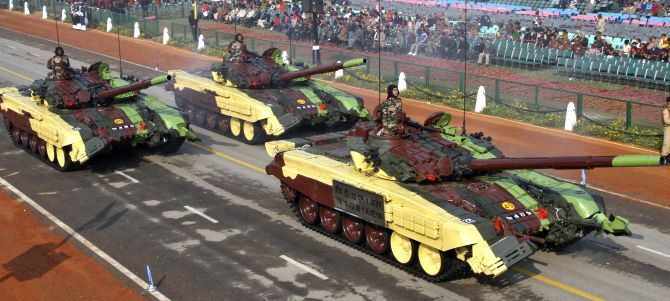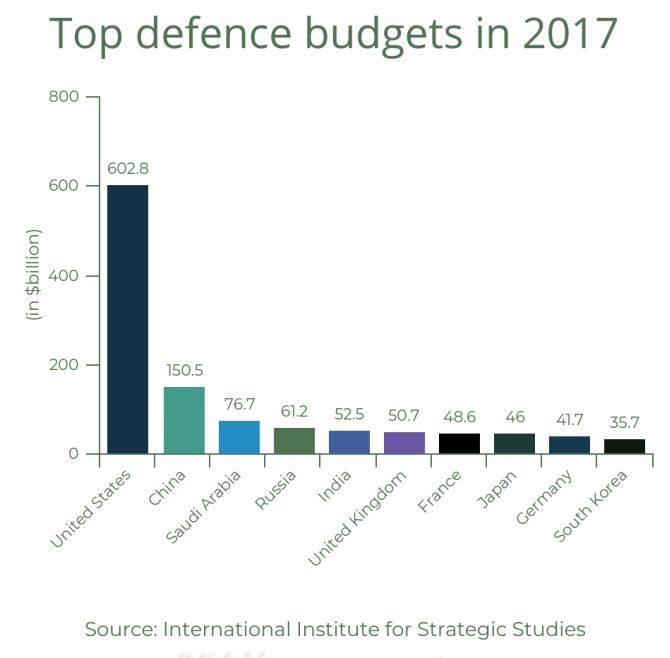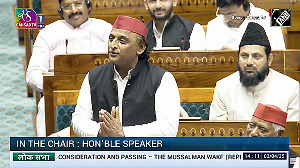The nation has the fifth largest defence budget in the world, at $52.5 billion in 2017 ($51.1 billion in 2016), overtaking the UK whose defence budget fell from $52.5 billion in 2016 to $50.7 billion in 2017.

India’s defence budget broke into the world’s top five, beating the United Kingdom for the first time, a new report by a London-based global think-tank has said, signalling a key shift in the military balance between the two countries.
India overtook the UK as the fifth-largest defence spender in the world in 2017 at $52.5 billion (Rs 3.35 lakh crore), up from $51.1 billion (Rs 3.26 lakh crore) in 2016, according to the ‘Military Balance 2018’ report by the International Institute for Strategic Studies.
In contrast, the UK’s defence budget fell from $52.5 billion in 2016 to $50.7 billion (Rs 3.24 lakh crore) last year.
“This represents a key shift in the military balance between India and the UK, with India allocating more capabilities to develop its regional resources than the UK in a global context,” said IISS Senior Fellow for South Asia, Rahul Roy-Chaudhury.
The report notes that while India continues to modernise its military capabilities, China, with the world’s second-largest defence budget after the US remains far ahead with three times India’s defence budget at $150.5 billion (Rs 9.6 lakh crore).
China’s real defence spending increased by nearly 25 per cent in 2016-17, whereas India’s rose by just 2.4 per cent.
“Post-Doklam, India’s military balance with China continues to be significantly in China’s favour. Since 2000, China has built more submarines, destroyers, frigates and corvettes than Japan, South Korea and India combined. China will continue to dominate the region militarily and seek to challenge the US in the region as well, Roy-Chaudhury notes.
According to the analysis, the Chinese army has over 600,000 more active personnel than India; it has nearly 1,200 tactical aircraft compared to India’s 785; and 55 more cruisers, destroyers and frigates than India.

The report takes note of the Indian government’s ‘Make in India’ policy, which aims to strengthen the defence-industrial base through measures such as “reforming the cap on foreign direct investment” and that the country is one of the top troop contributors to UN peacekeeping operations.
“The overall capability of the (Indian) army is limited by inadequate logistics, and shortages of ammunition and spare parts. Defence cooperation with the US continues to grow, with an increasing level of exercising and sales of US equipment.
“Development and procurement programmes across the services are aimed at replacing ageing equipment, but many projects have experienced significant delays and cost overruns, particularly indigenous systems,” the report finds.
IISS says the new Indian Joint Armed Forces Doctrine issued last year sees an “emerging triad” of space, cyber and special-operations capabilities complementing conventional land, sea and air capabilities as India continues to modernise its strategic forces, particularly its delivery systems.
Overall, the report found that China and Russia, with the world’s fourth-largest defence budget at $61.2 billion, are challenging the military supremacy of the US ($602.8 billion) and its allies and that the West can no longer rely on the strategic advantage it has enjoyed until now.
Saudi Arabia, with a defence spending of $76.7 billion, came in third to complete the world’s top five -- the US, China, Saudi Arabia, Russia and India.











 © 2025
© 2025